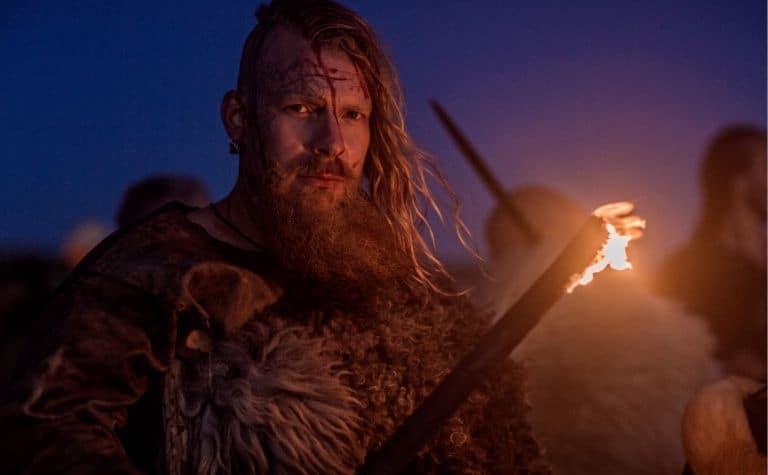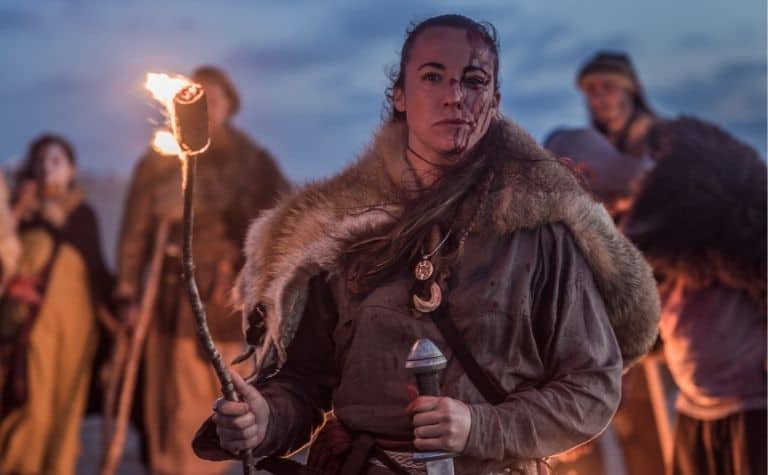Over a thousand years ago, the people of Scandinavia believed in paganism, a polytheistic religion that pre-dated the arrival of Christianity by centuries.
The “old way” sought to explain the mysterious and unseen workings of the universe and answer life’s biggest questions.
Today, as the old Norse religion enjoys a revival, practitioners are modernizing its core beliefs, including those relating to the afterlife.
The modern view of Valhalla is subject to strict and loose interpretations. On the one hand, there are those who assert that it is a destination only for those who die on the field of battle.
Others, however, maintain that Valhalla represents a vital spiritual guide for how to live one’s life.
From the Viking Age to the current information age, people of all faiths have pondered the afterlife.
For modern practitioners of the Norse religion, the concept of the afterlife is clouded by the legacy left behind by the Vikings and their unorthodox ideologies.
Whether viewed in a literal sense or in the abstract, to Norse religion practitioners, Valhalla is real and relevant, even now in the 21st century.
Also, see Why Do Soldiers in the Military Say “Until Valhalla”? to learn more.

Do people still believe in Valhalla?
To some, Valhalla is an actual destination that serves as an eternal reward for having lived (and died) a certain way.
For others, Valhalla represents a guiding light that allows believers to navigate a world full of moral challenges and emerge spiritually triumphant.
People still believe in Valhalla. The question is what Valhalla represents to them and how it influences the way they live their lives.
Modern Norse religious doctrine relating to the afterlife is somewhat nebulous and abstract in large part because even during the Viking Age, no Bibles or sacred texts spelled out how Valhalla and other aspects of the afterlife were structured.
Branches of modern Norse religion, to name a few, include:
- Asatru
- Heathenry
- Paganism
- Odinism
Though the sects go by different names and may have slightly different opinions regarding certain aspects of their spirituality, as far as Valhalla is concerned, the prevailing view is that Asatruars (followers of Asatru) and their compatriots are better off focusing on living than where they end up after death.
Also, see Who Is the God of War in Norse Mythology? to learn more.
The modern take on Valhalla and the afterlife
For today’s practitioners of the Norse religion, theirs is a decidedly life-affirming belief system.
Actions are not shaped or influenced by aspirations to reach everlasting bliss nor by fears of falling into eternal damnation. Norse religion teaches that the primary goal in life should be to impact others positively. (Also see Do Norse Pagans Pray?)
In fact, some believers of the Norse religion contend that even during the Viking Age, finding oneself in Valhalla was not a desirable outcome after death because it meant that one’s life ended violently on a battlefield far from home soil.
It also likely meant that the deceased would not be buried in his family’s plot with his ancestors as many Scandinavians of that era preferred. [1]
Guided by the principles of wyrd (the interconnectivity of everything in the universe) and fridh (hospitality and kinship toward others), today’s Norse religion teaches that every person should aspire to live life to the fullest with virtue and honor.
Simply put, the focus of living should be squarely on the here and now of daily life and not what happens (or where one ends up) after death. [2]
The modern view toward Valhalla is both pragmatic and idealistic in the sense that it urges followers to control what can be controlled (e.g., one’s actions and attitudes) and leaving a righteous legacy while dwelling less on resume-building for prospects in the afterlife.
This attitude is perhaps best exemplified by a passage from the centuries-old poem Havamal in which the all-father Odin poignantly states:
Cattle die, kinsmen die,
The self dies the same,
But the glory of reputation never dies
For the one who gets himself a good one. [3]
Also, see Is the Kraken Greek or Norse Mythology? to learn more.

Valhalla: the strict and literal view
Norse sagas and poems are quite specific in describing how those who enter Valhalla are selected.
According to Icelandic poet Snorri Sturluson’s definitive piece on old Norse ways, the Prose Edda, members of Odin’s einherjar (those who reside in Valhalla), are chosen from fallen warriors who die on the field of battle. [4]
For Valhalla hardliners, this would present a bit of a spiritual conundrum as presumably only those killed in military action would be eligible to enter the great hall of Odin’s einherjar.
Despite this extremely limited view, some advocate this strict interpretation of centuries-old dogma (and by the same token maintain that the souls of those who live immorally end up in the Norse version of hell). [5]
It is worth recalling that not even the all-father Odin and the goddess Frigg, with their enormous power and influence, were able to skirt the rules and gain entry into Valhalla for their beloved son Baldur.
He died tragically as the result of a prank gone horribly wrong.
Because he was not killed in battle, Baldur traveled to Hel, where he remained until Ragnarok. [6]
Modern Asatru Doctrine Promotes Inclusion and Tolerance
Modern Norse religious beliefs run contrary to the glorification of military activities espoused by the traditional Valhalla narrative.
They also oppose policies advocating exclusion and suppression of non-conforming views.
For instance, according to the Icelandic Asatru Association (one of the most prominent Norse religious organizations in the world):
- Asatru stresses universal harmony
- Asatru embraces tolerance
- Asatru does not endorse militarism, violence, hatred, chauvinism, or racism
With such openly pacifist views, this would seemingly be one major branch of modern Norse religion that does not align itself with Valhalla’s hardline interpretation. [7]
Valhalla is Only One Part of the Norse Afterlife
Valhalla is often (and quite mistakenly) viewed as the Norse counterpart to the Christian notion of heaven. In truth, it is but one of a multitude of destinations in the Norse afterlife.
Still, thanks to poems, sagas, and now cinema, it has been glorified as the preeminent haven for elite Viking warriors to enjoy each other’s company in the hereafter.
The Norse afterlife also includes:
- Valhalla – of all the destinations in the Norse afterlife, this is perceived as the most prestigious and restrictive as far as admission
- Folkvangr – overseen by the goddess Freyja, the “field of the people” is seen as a desirable place to spend the afterlife, despite the lack of fanfare
- Hel – despite the obvious phonetic similarity to the Christian hell, the Norse version is not a place of eternal damnation and punishment but rather the catch-all destination in the afterlife where the majority of believers’ souls would travel after death
- Ran – bearing the name of the Norse sea giantess, Ran was reserved for sailors who died at sea where they would spend eternity deep beneath the surface
- Burial mounds – in some instances, souls of the dead would not travel at all, remaining with the corpse in the burial mound instead
- Reincarnation – another possible destination after death is not in the afterlife, but rebirth through reincarnation (the prevailing belief is that a person can only be reincarnated into the same family lineage)
While Valhalla is synonymous with a glorious afterlife, Viking warriors spar with each other by day and feast by night.
Those who find themselves there are in a very select and exclusive company.
Fortunately for everybody else, there are other options, including one where reuniting with deceased family members is likely.
Final Thoughts
Humankind has grappled with the subject of mortality for millennia. Modern Norse religion advises focusing on the here and now rather than on the afterlife.
References:
[1] Source
[2] Source
[3] Source
[4] Source
[5] Source
[6] Source
[7] Source
[8] Source
